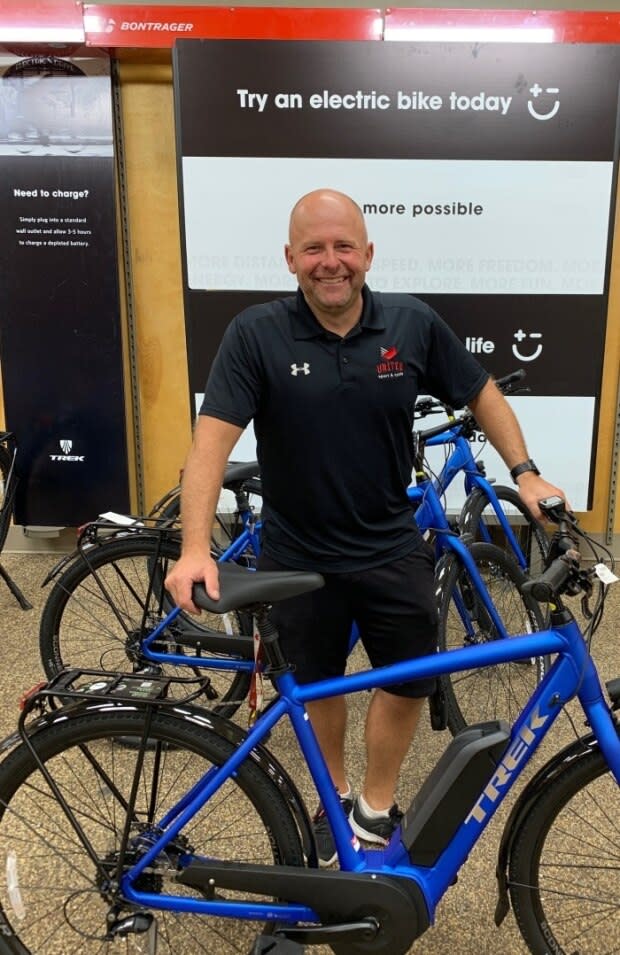Demand for e-bikes in Edmonton spikes during rebate blitz
Cycling fans are disappointed that the city cancelled an electric bike rebate program last week but shops in Edmonton say the brief blitz sparked a new interest in e-bikes and is still bringing in customers.
The city launched the rebate program on June 3 and after an overwhelming response, the city closed the offer five days later.
Kelly Hodgson, marketing operations manager at United Sport and Cycle, said the demand was extraordinary.
"Literally people lined up at the store. So we had a line up on the first day that it was available, of people over 50 deep," Hodgson told CBC News in an interview Friday.
Hodgson said they also got an influx of emails, calls and inquiries on social media with people asking to know more.
Michael MacFynn, public relations manager for Revolution Cycle, said they sold four times as many bikes as usual the weekend after the program was launched.
"For us it was massive," MacFynn said Friday. "We had people queuing up like crazy we had people buying online. It was huge.

In five days, the city received nearly 700 applicants for the program, the city manager in charge of the program, Stephanie McCabe, told council last week.
Her team was able to give the rebate — up 30 per cent of the cost of an e-bike to a maximum of $750 — to just over 80 people in 2020 at a $50,000 cost to the city.
The $100,000 would be used to offer rebates in 2021-22.
Last week, Coun. Scott McKeen asked council to discontinue the remaining two years of the program, saying he got complaints from many people who saw the program as lavish.
Councillors Aaron Paquette and Ben Henderson and Mayor Don Iveson voted to keep the rebate, in part because it helps support the city's Energy Transition Strategy to reduce greenhouse gases.
McKeen, who's had an e-bike for several years, said he feels guilty on both sides.
"I don't love the idea of being the one blamed for getting ready of e-bike rebates," McKeen told CBC News Friday.
McKeen said he'd support another program in the future with $100 rebates instead.
"But $500 to $750 is more money than a lot of people would ever spend on a bike," McKeen said. "So really it was a program for people with means — to give people who already have some financial wherewithal, more money."
E-bikes range in price between $2,000 to $10,000.
Universal appeal
"If you've tried an e-bike, chances are you own an e-bike," Hodgson said.
Hodgson said the five-day rebate blitz exponentially exposed more people to the appeal of e-bikes.
"We're still selling the bikes every single day," he said, attributing some of the demand to an increased awareness through that rebate period.
"It had a lot of people's eyes open to be able to say, 'oh an e-bike, this must be for more people than just again the elderly or the physically challenged: this must be for everybody."
"So I want to learn more, I want to know more."
'This is our Hawaii money' - Customers told Kelly Hodgson
People are attracted to e-bikes for a variety of reasons, he said, including fitness, increased mobility, cutting down the cost of commuting to work, Hodgson said.
With the option of choosing the level of assistance on an e-bike, riders are able to go farther than on a traditional bike.
"They'd probably cap out at 20 kilometers but would love to see what a 60 km - 70 km ride would look like," Hodgson noted. "And with the assistance of an e-bike they can do that."
Hodgson also started to notice a different kind of customer coming in during the COVID-19 pandemic.
"A number of them were saying, 'this is our Hawaii money or this is our Mexico money that we were planning on going away'," he said. "And obviously with what's going on in COVID, they wanted to enjoy more of our city and our province and tour through e-bike."
MacFynn echoed the wide-spread use of an e-bike for people looking to be more active or those with limited abilities.
"People like my wife, who has M.S. — it was a gateway to getting out and being active and not being fearful that they wouldn't be able to get home on their bicycle or that they'd have to walk their bike up the hill."
Rebate program or not, MacFynn is worried he's not going to be able to get enough stock in, citing a shortage of supply in North America.
McKeen is resolute that the program was inappropriate and even insulting to people who've been laid off or are struggling financially during COVID-19.
"This program hit a very narrow segment of the community and I'm not sure if that segment of the community needed that much help."
McKeen said he'd rather see the $100,000 used toward bike infrastructure, like lock-ups, to encourage people to ride their bikes to shop, dine and get around in general.
@natashariebe

